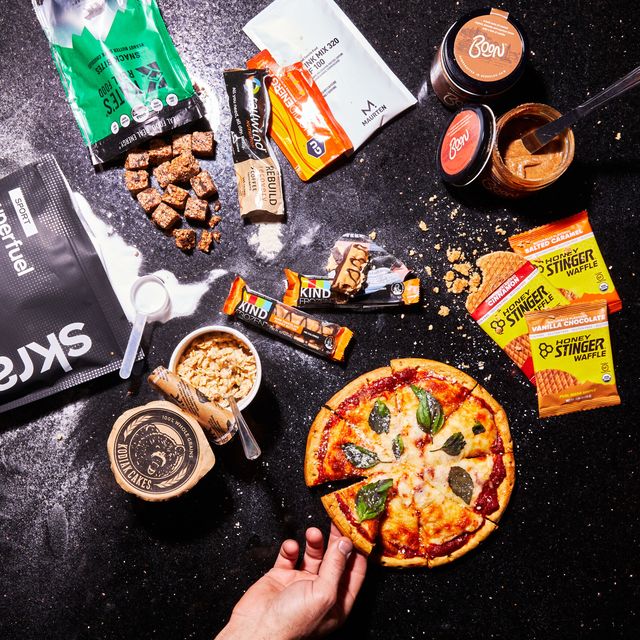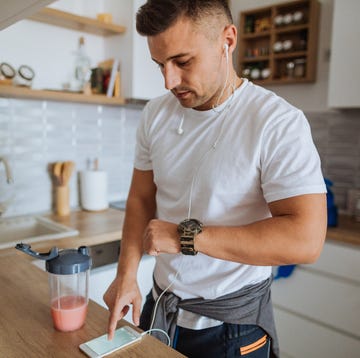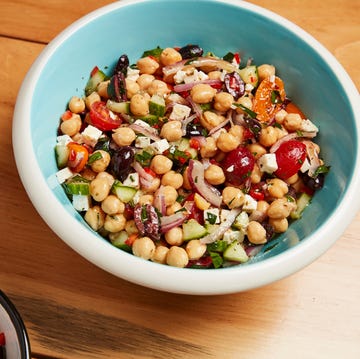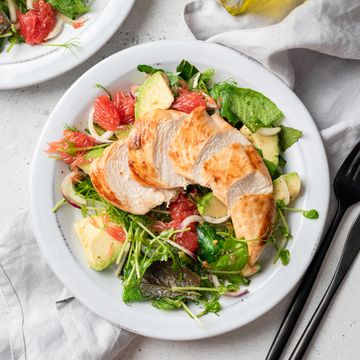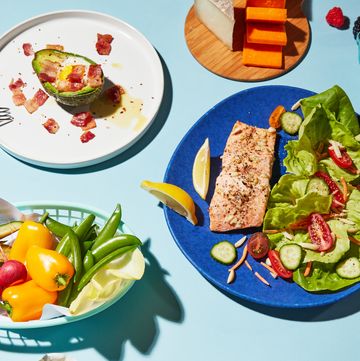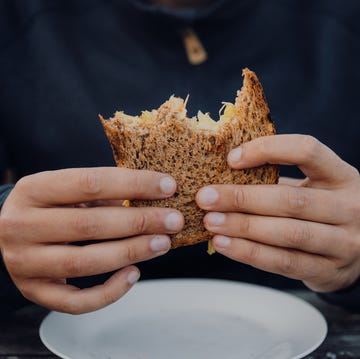People love half marathons for many reasons. One of those is that training for 13.1 isn’t as time consuming as training for a full marathon, but you still gain a serious sense of accomplishment. Also, a few key training steps ring true for all race distances, and one of those is nailing down your fueling strategy.
Here, dietitians explain exactly how to plan your nutrition for the day before and the day of your race, and the science behind these options.
What to Eat the Day Before a Half Marathon
You might wonder if it’s as necessary to carb load for 13.1 as it is for 26.2. And while the details may differ, you do want to shift your calories and eat more carbs, just like you would the day before a long run on your training plan, Megan Robinson, C.S.S.D, registered sports dietitian, and certified level 1 RRCA run coach tells Runner’s World.
That’s because, technically speaking, carb-loading really comes into play any time you are out on the road for more than 90 minutes. (It’s not warranted for exercise lasting less than 90 minutes.)
You can carb load in as little as one day for a half marathon, but to prevent worrying about whether you’re taking in enough, aim for that macronutrient breakdown two to three days before race day.
You don’t necessarily need to increase your calories—just make sure the majority of those calories come from carbs, ideally at each meal the day or two before race day. If you normally fill half your plate with vegetables, Robinson suggests reducing that amount to about one-quarter to avoid any potential GI distress, and increasing your grain portion size to about half of your plate, choosing options like rice or pasta. You can fill the remainder of your plate with lean protein like chicken, beef, or fish, she says.
While you are at rest, your body will have adequate time and energy to absorb and store those nutrients you ate, and then you’ll be able to rely on this fuel for the following day. A great way to try this out while you’re training is to have this meal the day before your planned long runs.
What to Eat the Morning of a Half Marathon
The meal before the race is also very important, as you want to toe the starting line with a tank that’s primed, but neither empty nor overflowing. Your prerace meal should be rich in carbohydrate to provide energy, with a little protein and fat, Kelly Jones, M.S., R.D., C.S.S.D., sports dietitian tells Runner’s World. Just like all your other meals, this should be something you’re familiar with and have trialed while training, she says.
Not sure what to eat beforehand? Try a bowl of oatmeal topped with a sliced banana, nuts, and honey, or a bagel topped with nut butter and sliced banana, three hours before run time, Robinson suggests. With either of these options, you’ll get quick and long-acting carbs as well as some protein and fat to prevent a blood sugar spike and crash, Jones says.
What to Eat During a Half Marathon
Now that you know what to eat before a half marathon, it’s time to tackle the final question: “How do I avoid running on empty in those last few miles of the race?”
As you may have noticed during your training, when you’re on the road for fewer than 75 minutes, you can usually rely on water, sports drinks, and your body’s own glycogen stores to carry you along. Any longer, and you begin to deplete those stores. Your muscles run out of fuel, and your body—not to mention your attitude—starts to drag.
If you’ve ever had a long run that started strong and then got slower and slower, it may be time to consider what you did during the first few miles of the long runs that you didn’t do during the last few miles. Many runners head out the door with a full tank but, feeling great, they neglect to re-fuel over the next few miles.
If you don’t start fueling within that first hour, it’s likely that your empty tank will catch up with you, and you’ll bonk. Once your muscle glycogen stores are depleted, it can also be very difficult to adequately recover during your run, which can make getting to the finish line feel extra tough.
To avoid this, you will need to replenish with carbohydrates, sodium, and fluids to maintain intensity and endurance, says Jones. Of course you don’t want to try anything new on race day. So aim to practice your race day nutrition on at least three of your long runs and during tempo runs, so you can monitor how your body responds to the type and amount of carbs you consume while running, says Robinson.
Robison suggests runners consume at least 30 grams of carbs every 30 to 40 minutes during the race. For those who predict they’ll finish in an 1.5 hours or less, fuel once mid-way through, she says.
Most importantly, don’t be afraid of fueling. If you’ve tried a product in the past and didn’t care for it or it didn’t sit well with you, then try something else.
Whatever concentrated form of fuel you are taking in, remember to dilute it with adequate fluids to help digestion and absorption while running.
Lastly, find out what gel or product your race will be handing out. If you can tolerate it or like the brand, you’ll know that you won’t need to pack your own on race day. You might also try to find out at what miles the race will be handing out product and mimic that in your training to practice for race day. But if the chosen brand doesn’t work for you, that’s when you want to plan ahead.
The Bottom Line on How to Fuel a Half Marathon
Practice makes perfect. You can start mastering your nutrition needs as soon as you start training for your race. This doesn’t have be overly complicated process, you can start with the things you’re already familiar with and like, then go from there.
Pamela Nisevich Bede, M.S., R.D., is the author of Fuel the Fire, a nutrition and body confidence guidebook for the female athlete.

Monique LeBrun joined the editorial staff in October 2021 as the associate health and fitness editor. She has a master’s degree in journalism and has previously worked for ABC news and Scholastic. She is an avid runner who loves spending time outside.
Dr. Namrita Brooke is a full-time endurance sport coach and sport nutritionist advising active individuals and amateurs to professional athletes. She is also an adjunct professor in the Department of Movement Sciences and Health at University of West Florida. Professionally, she also serves on the Board of Editors of the Sports Nutrition Care Manual and remains involved in nutrition and exercise-related research, student mentorship, and coach development. Namrita's personal athletic experience ranges from ultra-endurance mountain biking to off-road triathlon, cross-country mountain bike racing, gravel cycling, duathlon, cyclocross, running, and trail running. Her research background includes hydration and sports drink research, and the interaction of nutrition, physical activity, and the brain.
